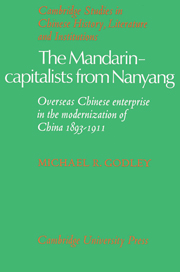 The Mandarin-Capitalists from Nanyang
The Mandarin-Capitalists from Nanyang Published online by Cambridge University Press: 23 September 2009
Nanyang capitalists were in a special position to assist China's early modernization. Their wealth and business experience obviously prompted high officials to respond favorably to Chang Pi-shih's initiatives toward the business class abroad, but the overseas Chinese had another more subtle appeal. As Westernized Chinese, men with practical knowledge of foreign ways who still desired to identify with elements of the traditional civilization, returning merchants came as close as anyone to maintaining that precarious balance between Western techniques and Chinese principles long sought by Chang Chih-tung and the self-strengtheners.
In many ways, the Nanyang capitalists were foreigners. They served alien masters, followed Western laws and developed a taste for certain aspects of a non-Chinese style of life. The nationalist awakening as experienced in the Chinese communities of Southeast Asia, however, helped revive interest in traditional moral teachings even as Confucius came under attack from native sons sent to study abroad. As Confucian-capitalists and gentlemen-merchants, the overseas Chinese may well have seemed to combine the best of both worlds. They brought capital and Western ideas but, unlike foreigners, they spoke Chinese, quoted the classics and were willing to operate within the traditional system even as they endeavored to elevate their own social position. Furthermore, they were not openly backed by gunboats.
To save this book to your Kindle, first ensure [email protected] is added to your Approved Personal Document E-mail List under your Personal Document Settings on the Manage Your Content and Devices page of your Amazon account. Then enter the ‘name’ part of your Kindle email address below. Find out more about saving to your Kindle.
Note you can select to save to either the @free.kindle.com or @kindle.com variations. ‘@free.kindle.com’ emails are free but can only be saved to your device when it is connected to wi-fi. ‘@kindle.com’ emails can be delivered even when you are not connected to wi-fi, but note that service fees apply.
Find out more about the Kindle Personal Document Service.
To save content items to your account, please confirm that you agree to abide by our usage policies. If this is the first time you use this feature, you will be asked to authorise Cambridge Core to connect with your account. Find out more about saving content to Dropbox.
To save content items to your account, please confirm that you agree to abide by our usage policies. If this is the first time you use this feature, you will be asked to authorise Cambridge Core to connect with your account. Find out more about saving content to Google Drive.